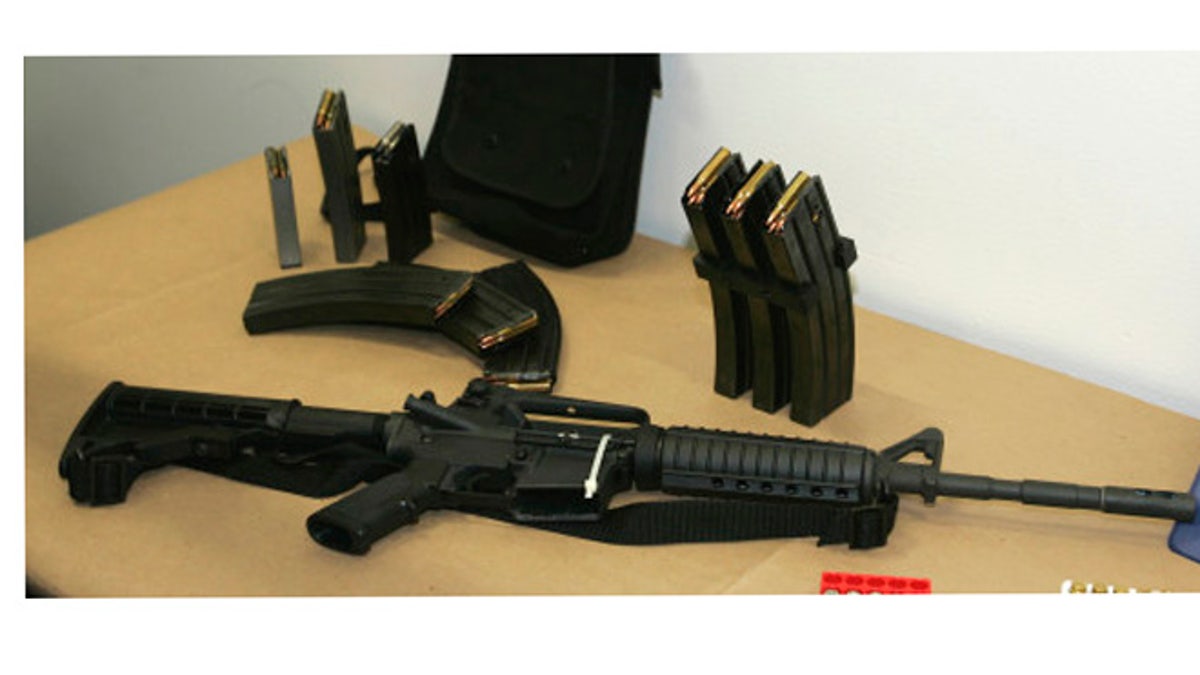
FILE - This March 27, 2006 file photo, shows a Bushmaster AR-15 semi-automatic rifle and ammunition on display at the Seattle Police headquarters in Seattle. The maker of the Bushmaster rapid-fire weapon used to kill schoolchildren in Connecticut on Friday, Dec. 14, 2012, was put up for sale on Tuesday, Dec. 18, 2012, as investors soured on the gun business. (AP Photo/Ted S. Warren, File)
Washington – While Congress prepares to debate renewing the federal assault-weapons ban, several states and cities already are pursuing bans of their own in the wake of high-profile mass shootings this year.
At least five states, including Georgia and Vermont, are pressing ahead with new legislation. Other states, like Maryland, are taking a closer look at their existing laws and searching for ways to strengthen them.
After the shooting rampage at Sandy Hook Elementary School in Newtown, Conn., which left 20 students and six educators dead, some of these proposals may stand a better chance of passing than any in Congress, where any gun ban is likely to meet resistance in the Republican-controlled House. But in states like Illinois, gun manufacturers are pushing back, threatening to leave if laws limiting guns are put in place.
In Illinois, the Democrat-led push for new legislation started after the Aurora, Colo., movie theater massacre. Other states began to move following the Newtown shooting.
The following states are looking to beef up their gun laws:
Vermont: Burlington City council member Norman Blais’ proposal for a municipal ban on assault weapons with high-capacity ammunition clips has gotten mixed reviews. Two of his fellow council members say the city is better off focusing on mental health issues, but Blais is pushing forward.
Even if the ban is approved, state law bars municipalities from adopting the ordinance, so any change would require action by both the city and state legislature, which seems unlikely. Calls to Blais’ office for comment were not returned.
Illinois: Gun manufacturers in Illinois have threatened to leave the state -- and take with them hundreds of jobs and millions of dollars in business – if an assault weapons ban is enacted there.
“It’s a substantial industry,” ArmaLite owner Mark Westrom told FoxNews.com. “Would we move? We would have to.” Westrom said he’s already been contacted by two states about moving their operations.
Westrom says he and the state’s three other gun manufacturers have been vilified by Gov. Pat Quinn in a political play to seem sympathetic to voters. He also criticized the governor for taking “too easy and too narrow of a view” on the subject. “I’ve got news for (Quinn), we’re not the problem and his proposals aren’t going to make (Illinois) a safer state.”
Quinn pushed for the ban after the Aurora shooting, saying at the time that "it's very clear that these particular weapons are not designed to do anything but to have human targets." Repeated calls to the governor’s office for comment were not returned. Earlier this month an appeals court ruled that a state law banning most people from carrying handguns in public is unconstitutional.
Georgia: State Sen. Vincent Fort, a Democrat from Atlanta, says he’ll introduce bills in 2013 to ban assault rifles and limit the number of bullets a gun can hold.
Georgia is a state that has traditionally sided with gun owners. During the last legislative session, there were a number of proposals aimed at loosening laws that included letting people carry concealed weapons in schools, college campuses, most government buildings and in bars.
The state Senate also approved a bill that would lower the concealed carry license age requirement from 21 to 18, as well as a bill that would force law enforcement agencies to return all seized firearms not being held as evidence to their owners no later than 30 days after the court renders its final judgment.
Virginia: The issue of gun control likely will take center stage during next year’s gubernatorial election. Virginia is one of two states that will elect a governor in 2013. Their current governor, Bob McDonnell, said he wants to arm teachers and principals with guns to keep kids safe. Virginia limits its governors to one term.
The likely Democratic nominee, Terry McAuliffe, says he wants the state to return to a one-handgun-per-month law -- a limit Virginia Republicans lifted in 2012. Attorney General Ken Cuccinelli, the likely Republican challenger, sided with McDonnell and said, “leaving options for defensive schools on the table is wise.”
Pennsylvania: The political winds could be shifting in the Keystone State, which has had a complicated history with gun laws. In the past, most politicians adopted a pro-gun stance or kept their opinions to themselves. The National Rifle Association has poured millions of dollars into state and local elections and backed candidates who have had pro-gun views.
But in the days following the Newtown shooting, there seems to be a change in the air. U.S. Sen. Bob Casey, a Democrat who was given high marks from the NRA, reversed his long-held stance last week and told a local paper that he would support bills to ban assault weapons and high-capacity ammo clips. State Rep. Dan Frankel, taking his cue from these statements, reportedly says he plans to push a "comprehensive" Pennsylvania assault-weapons ban.
Maryland: The state's Democratic governor, Martin O’Malley, says he’ll introduce a gun-control package in the upcoming legislative session that would limit the type of guns allowed in the state, restrict access to guns by the mentally ill and identify ways to make schools safer. Maryland already has an assault-weapons ban on the books.
A new USA Today/Gallup poll shows Americans are split on the issue, with 46 percent favoring enforcing current laws and 47 percent favoring passing new ones. The poll shows a ban on assault weapons – the kind President Obama wants pulled from shelves – hasn’t gained much traction. Forty-four percent support such a move while 51 percent said they are against it.












































